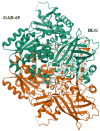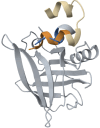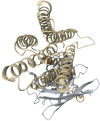Decoding the relationship between cow's milk proteins and development of type 1 diabetes mellitus
- PMID: 39420935
- PMCID: PMC11460975
- DOI: 10.20945/2359-4292-2023-0248
Decoding the relationship between cow's milk proteins and development of type 1 diabetes mellitus
Abstract
Objective: To analyze in silico the evidence of molecular mimicry between human beta-cell autoantigens and cow's milk proteins as a potential type 1 diabetes mellitus (T1DM) trigger.
Materials and methods: The in silico analysis was performed using bioinformatics tools to compare the amino acid sequences of cow's milk proteins (bovine serum albumin [BSA] and beta-lactoglobulin [BLG]) and human beta-cell autoantigens (glutamic acid decarboxylase-65 [GAD-65], insulin, and zinc transporter 8 [ZnT8]). The structural and functional characteristics of the proteins were analyzed to identify potential molecular mimicry mechanisms.
Results: The results of the in silico analysis showed significant sequence similarity between BSA/BLG and GAD-65/human insulin/ZnT8, ranging from 19.64% to 27.27%. The cow's milk proteins evaluated shared structural features with the beta-cell antigens selected for comparison, indicating a potential for molecular mimicry between these proteins.
Conclusion: The findings of this study provide further evidence for a potential role of cow's milk proteins in triggering T1DM. The in silico analysis suggests that molecular mimicry mechanisms between cow's milk proteins and human beta-cell antigens may contribute to the autoimmune response leading to T1DM.
Keywords: Type 1 diabetes mellitus; autoantigens; cow’s milk; molecular mimicry.
Conflict of interest statement
Disclosure: no potential conflict of interest relevant to this article was reported.
Figures












Similar articles
-
Relation between antibodies to islet cell antigens, other autoantigens and cow's milk proteins in diabetic children and unaffected siblings at the clinical manifestation of IDDM. The Childhood Diabetes in Finland Study Group.Autoimmunity. 1996;23(3):165-74. doi: 10.3109/08916939608995340. Autoimmunity. 1996. PMID: 8879452
-
Childhood type 1 diabetes mellitus and risk factor of interactions between dietary cow's milk intake and HLA-DR3/DR4 genotype.J Biomol Struct Dyn. 2022;40(21):10931-10939. doi: 10.1080/07391102.2021.1953599. Epub 2021 Jul 20. J Biomol Struct Dyn. 2022. PMID: 34282715
-
Increased frequency of IgM antibodies to cow's milk proteins in Hungarian children with newly diagnosed insulin-dependent diabetes mellitus.Eur J Pediatr. 1996 Oct;155(10):885-9. doi: 10.1007/BF02282839. Eur J Pediatr. 1996. PMID: 8891559
-
Cow's milk and immune-mediated diabetes.Proc Nutr Soc. 2000 Nov;59(4):573-9. doi: 10.1017/s0029665100000811. Proc Nutr Soc. 2000. PMID: 11115792 Review.
-
Bovine serum albumin and insulin-dependent diabetes mellitus; is cow's milk still a possible toxicological causative agent of diabetes?Food Chem Toxicol. 2004 May;42(5):707-14. doi: 10.1016/j.fct.2004.01.002. Food Chem Toxicol. 2004. PMID: 15046815 Review.
Cited by
-
Immune Reactivity to Raw and Processed Foods and Their Possible Contributions to Autoimmunity.Foods. 2025 Apr 15;14(8):1357. doi: 10.3390/foods14081357. Foods. 2025. PMID: 40282759 Free PMC article. Review.
References
MeSH terms
Substances
LinkOut - more resources
Full Text Sources
Medical
